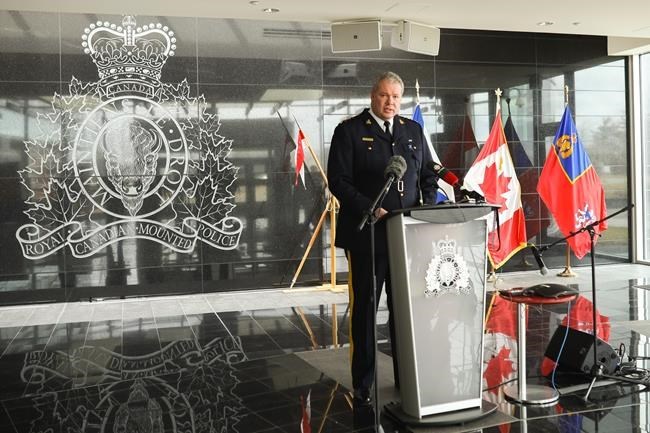HALIFAX — A senior RCMP officer in Nova Scotia who obtained search warrants for the investigation into the mass shooting in April was grilled in court Wednesday about why most of those documents remain heavily redacted.
Search warrants are supposed to be made public after they have been executed, with some exceptions, but in this case the Crown has produced heavily redacted versions that are now the subject of a court challenge by media outlets, including The Canadian Press.
RCMP Sgt. Angela Hawryluk was cross-examined by media lawyer David Coles, who repeatedly asked the officer to justify why large sections of the warrants remain blacked out and beyond public scrutiny.
Hawryluk said the release of key information could jeopardize the RCMP's ongoing investigation of Gabriel Wortman's murderous rampage on April 18-19, which claimed the lives of 22 victims over a 13-hour span.
The documents in question are referred to as "information to obtain" or ITO applications, which include five search warrants and two production orders that Hawryluk filed with a justice of the peace in April as the RCMP started their investigation.
In each case, the justice of the peace granted Hawryluk a so-called sealing order, which meant the documents had to remain secret until searches had been completed and evidence was seized.
"I had no intention of any of the ITOs being revealed to the public," Hawryluk told the court.
Coles suggested that was an extreme position.
"Your position is that any information in the ITOs could compromise the investigation, even though the Crown has released some information?" he asked.
Hawryluk agreed.
Coles challenged Hawryluk's assertion that all the information in every document should remain beyond public scrutiny to ensure the RCMP's ongoing investigation is not compromised.
The lawyer pointed to previously redacted content, saying its release would have no impact on the investigation, now in its third month.
In particular, he noted that Hawryluk's resume was originally deemed off limits, as was the name of an anthropologist who was called in to help Nova Scotia's medical examiner with his work on the case.
"If the anthropologist's name was released today, would that affect the investigation?" Coles asked Hawryluk.
"No, it would not," she replied.
Meanwhile, Crown lawyers argued Wednesday that certain names in the documents had to remain confidential because these people and at least one business have been deemed "innocent third parties" whose identities must be protected.
Provincial court Judge Laurel Halfpenny-MacQuarrie signed an order Wednesday to release some previously redacted content, though none of that information shed any new light on the case.
Provincial Crown attorneys Mark Heerema and Shauna MacDonald have argued that certain material — including the models of guns the killer used — should remain sealed for six months. As well, they say the content pertaining to innocent persons should be sealed permanently.
The Crown has also cited the Dennis Oland murder case in 2012, during which a New Brunswick court ordered search warrants to be sealed for six months.
In the mass shooting case, some of the victim's relatives have complained they have not been told enough about what happened to their loved ones or how the RCMP's actions may have played a role in their deaths. Most of the families are seeking to register a class action lawsuit against the RCMP.
The gunman, who was disguised as a Mountie and was driving a look-alike police cruiser, was fatally shot by an RCMP officer on the morning of April 19 when he stopped at a gas station in Enfield, N.S., about 35 kilometres north of Halifax.
This report by The Canadian Press was first published Aug. 12, 2020.
Michael MacDonald, The Canadian Press



